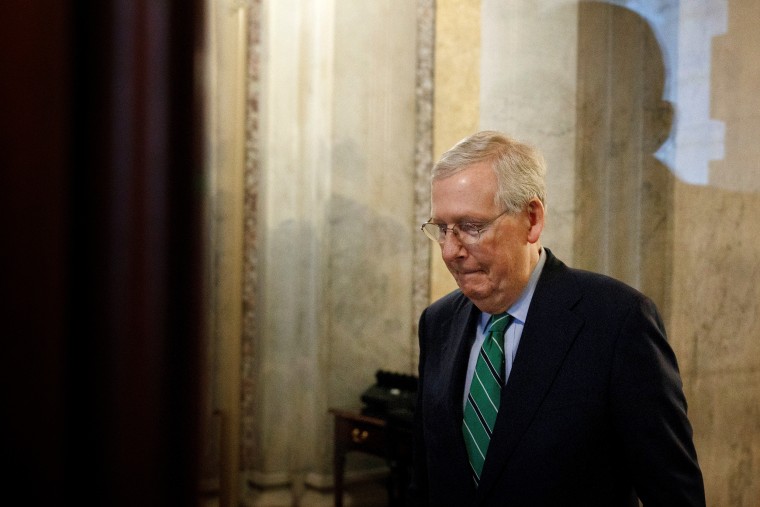Nearly a week after House Democrats approved an ambitious economic aid package, it's not clear when, or even if, Senate Republicans or Donald Trump's White House will craft a counter-offer. Despite calls for urgent action from economists and the Federal Reserve, GOP leaders have said they intend to "pause" for a while, pushing off prospective negotiations.
But even in the event there are bipartisan talks about bolstering an economy in crisis, it's increasingly clear what Republicans don't want in the bill. Politico reported late yesterday:
Mitch McConnell promised House Republicans on Wednesday that the beefed up unemployment benefits enacted earlier this spring "will not be in the next bill." ... [McConnell] said the $600 weekly boost in unemployment benefits won't continue -- a vow he hadn't previously made.
As we've discussed, one of the critical elements of the $2 trillion economic aid package approved by Congress in March is its "enhanced" unemployment benefits. Democrats crafted a policy in the CARES Act that provides Americans who've lost their jobs $600 per week, on top of the benefits available through state unemployment plans.
With tens of millions of Americans pushed from their jobs by the pandemic, the policy is a lifeline to families across the country. It is, however, temporary: the current benefit will expire in July.
In the HEROES Act that passed the House last week, current jobless benefits would be extended until January 2021. McConnell reportedly signaled yesterday that Republicans won't allow the policy to be extended at all.
Among GOP leaders, McConnell, who's up for re-election this year, isn't alone. Donald Trump reportedly expressed opposition to an extension during behind-closed-doors comments this week, and Sen. Lindsey Graham (R-S.C.) recently assured business leaders that current benefits would continue "over our dead bodies."
Republicans have finally settled on a tangible economic goal: making sure the unemployed have less money.
When pressed, GOP officials tend to present something resembling a policy argument: if the unemployed are getting by on existing jobless benefits, they'll feel less urgency about rejoining the workforce. Cutting them off, Republicans insist, won't have adverse effects, since these Americans will simply replace their benefit income with employment income. In theory, the GOP's pitch may have some surface-level appeal.
But in practice, more than 38 million Americans have filed for unemployment over the last couple of months; the unemployment rate will almost certainly be above 20% very soon; and any realistic projection suggests the jobs crisis will still be painfully real when the existing benefits plan expires in July.
In other words, over the summer, McConnell, Trump, and their Republican brethren will effectively tell tens of millions of Americans, "Good news: we're scrapping the money you've relied on as a lifeline during this crisis, but you can now all go back to work." The directive presupposes that employers everywhere will be hanging "help wanted" signs -- long before a vaccine or effective COVID-19 treatment is available -- that the unemployed will be eager to take advantage of.
Will some jobless Americans re-enter the workforce if enhanced benefits disappear? Probably. Will there be enough job openings in August for the Americans who lost their jobs and want to re-enter the workforce? That's a much tougher sell.

